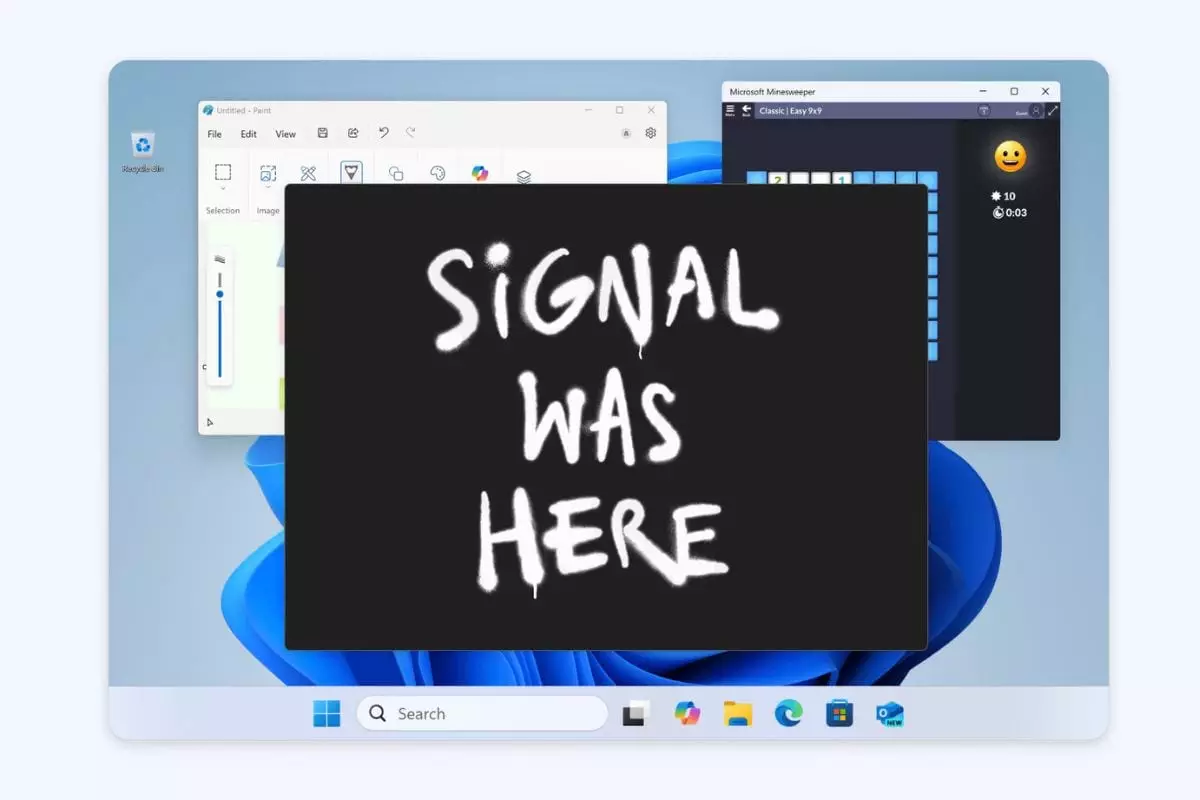In an era where digital privacy feels increasingly compromised, Signal, the renowned privacy-centric messaging application, has unveiled a decisive security measure to safeguard user data. On Wednesday, the company introduced its Screen Security feature, a robust response to Microsoft’s controversial Recall function. This new addition stands as a testament to Signal’s unwavering commitment to user privacy in a landscape where powerful tech corporations often prioritize convenience over confidentiality.
Microsoft’s Recall, which hit the market under its AI Copilot initiative, can be likened to a digital watchdog that continuously monitors user behavior, taking screenshots without explicit user consent. The backlash from privacy advocates echoed loudly, highlighting the glaring deficiencies in such tracking mechanisms. Critics were right to question Microsoft’s intrusive methodology; after all, the average user doesn’t sign up to be part of a surveillance study while simply using their computer.
Signal’s Preemptive Stance
Contrary to the narrative of helplessness that some tech companies have adopted in the face of growing privacy threats, Signal has taken a proactive approach. By defaulting Screen Security On for all Windows 11 users post-update, Signal is not just responding to a crisis but is also sending a clear message: users deserve control over their digital experiences. This remarkable move signifies a shift towards defending user autonomy rather than yielding to invasive tech practices that could jeopardize sensitive communication.
The Screen Security feature, akin to Digital Rights Management (DRM) technologies employed by streaming giants like Netflix, creates an impermeable barrier against unauthorized screen captures. Signal’s decision emphasizes that protecting user interactions isn’t merely a technical consideration; it is an ethical imperative in an age where personal data is often seen as a commodity.
Accessibility vs. Privacy: A Delicate Balance
However, in its earnest endeavor to bolster privacy, Signal has acknowledged a potentially consequential trade-off: accessibility. The activation of Screen Security might hinder the functionality of essential accessibility tools like screen readers and magnification software. This unintended consequence outlines the nuanced landscape of digital security, where the right to privacy can, at times, collide with the necessity of accessibility.
Signal’s transparency about this limitation is commendable, allowing users to make informed choices about their settings. Disabling the Screen Security option is an available solution, although it comes with a cautionary warning about the privacy risks entailed, particularly regarding Microsoft’s capabilities. This delicate balancing act illustrates the complexities of modern technology, where no solution exists in a vacuum, and every decision can have far-reaching implications.
Stoking Conversations on Ethical AI Development
Signal’s critique of Microsoft extends beyond mere feature wars; it is a call to action for ethical AI development practices. In its official statement, Signal emphasizes the importance of developers considering privacy implications when designing systems like Recall. The implication is clear: technology giants must not merely innovate; they must do so responsibly, prioritizing the sanctity of user data over the allure of new features.
The conversation stirred by Signal is crucial. It urges developers, policymakers, and users to engage actively in discussions surrounding privacy and AI. While labeling Microsoft’s Recall feature as intrusive might seem extreme, it illustrates a growing movement demanding accountability from those wielding technological power. Signal is advocating for a future where privacy protection isn’t an afterthought or a last-resort measure but an integral part of design from the outset.
A Rallying Cry for User Empowerment
Ultimately, Signal’s introduction of the Screen Security feature is more than just a defensive maneuver against a rival’s controversial product. It represents a burgeoning ethos among technology users, one that values privacy and control over haphazard advances in AI. Signal’s commitment to championing this ethos invites users to reclaim their autonomy in the digital sphere. When faced with technological advancements that seem more inclined to surveil than serve, Signal is forging a path towards a future where privacy and user empowerment are at the forefront of the conversation.

